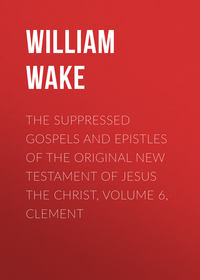Kitabı oku: «The suppressed Gospels and Epistles of the original New Testament of Jesus the Christ, Volume 6, Clement», sayfa 8
CHAPTER IV
We shall rise, and be judged, in our bodies; therefore we must live well in them; 6 that we ought, for our own interest, to live well; though few seem to mind what, really is for their advantage; 10 and we should not deceive ourselves: seeing God will certainly judge us, and render to all of us according to our works.
AND let not any one among you say, that this very flesh is not judged, neither raised up. Consider, in what were you saved in what did you look up, if not whilst you were in the flesh?
2 We must, therefore, keep our flesh as the temple of God. For in like manner as ye were called in the flesh, ye shall also come to judgment in the flesh. Our one Lord Jesus Christ, who has saved us, being first a spirit, was made flesh, and so called us; even so we also shall in this flesh receive the reward.
3 Let us, therefore, love one another, that we may attain unto the kingdom of God. Whilst we have time to be healed, let us deliver up ourselves to God our physician, giving our reward unto him.
4 And what reward shall we give?—Repentance out of a pure heart. For he knows all things beforehand, and searches out our very hearts.
5 Let us, therefore, give praise unto him: not only with our mouths, but with all our souls; that he may receive us as children. For so the Lord hath said; They are my brethren, who do the will of my father.
6 Wherefore, my brethren, let us do the will of the Father, who hath called us, that we may live. Let us pursue virtue, and forsake wickedness, which leadeth us into sins; and let us flee all ungodliness, that evils overtake us not.
7 For, if we shall do our diligence to live well, peace shall follow us. And yet how hard is it to find a man that does this? For almost all are led by human fears, choosing rather the present enjoyments, than the future promise.
8 For they know not how great a torment the present enjoyments bring with them; nor what delights the future promise.
9 And if they themselves only did this, it might the more easily be endured; but now they go on to infect innocent souls with their evil doctrines; not knowing that both themselves, and those that hear them, shall receive a double condemnation.
10 Let us, therefore, serve God with a pure heart, and we shall be righteous: but if we shall not serve him, because we do not believe the promise of God, we shall be miserable.
11 For thus saith the prophet; Miserable are the double-minded, who doubt in their heart, and say, these things we have heard, even. in the time of our fathers, but we have seen none of them, though we have expected them from day to day.
12 O ye fools! compare yourselves to a tree; take the vine for an example. First it sheds its leaves, then it buds, then come the sour grapes, then the ripe fruit; even so my people has borne its disorders and afflictions, but shall hereafter receive good things.
13 Wherefore my brethren, let us not doubt in our minds, but let us expect with hope, that we may receive our reward; for he is faithful, who has promised that he will render to everyone a reward according to his works.
14 If, therefore, we shall do what is just in the sight of God we shall enter into his kingdom, and shall receive the promises; Which neither eye has seen, nor ear heard, nor have entered into the heart of man.
15 Wherefore let us every hour expect the kingdom of God in love and righteousness; because we know not the day of God's appearing.
CHAPTER V
A FRAGMENT.
Man's immortal nature a type of the Lord's kingdom.
1 * * * For the Lord himself, being asked by a certain person, When his kingdom should come? answered, When two shall be one, and that which is without as that which is within; and the male with the female, neither male nor female.
2 Now two are one, when we speak the truth to each other, and there is (without hypocrisy) one seal in two bodies:
3 And that which is without as that which, is within;—He means this; he calls the soul that which is within, and the body that which is without. As therefore thy body appears, so let thy soul be seen by its good works.
4 And the male with, the female, neither Male nor female;—He means this; he calls our anger the male, our concupiscence the female.
5 When therefore a man is come to such a pass that he is subject neither to the one nor the other of these (both of which, through the prevalence of custom, and an evil education, cloud and darken the reason,)
6 But rather, having dispelled the mist arising from them, and being full of shame, shall by repentance have united both his soul and spirit in the obedience of reason; then, as Paul says, there is in us neither male nor female.
REFERENCE TO THE SECOND EPISTLE THE CORINTHIANS
[Archbishop Wake is the translator of this Second Epistle, which he says was not of so great reputation among the primitive Fathers as the first. He defends it notwithstanding; and in answer to those who objected to Clement's First Epistle, that it did not duly honour the Trinity; the Archbishop refers to this as containing proof of the writer's fulness of belief on that point.]
